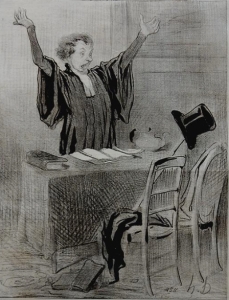Like most public defenders, we have clients who can’t even get a job in a car wash because they’re on probation. Who wants to hire a criminal, especially when they come with a nosy probation officer attached?
So we’re deeply impressed that Trump is contemplating hiring an ex-offender on probation! For Secretary of State! We’d unfairly stereotyped the President-elect as a troglodyte likely to bring back public hanging, flogging and Sunday blue laws forbidding restaurants to serve mimosas for brunch until noon. But instead he’s made a demonstrated commitment to reintegrating ex-offenders into the community!
The lucky candidate for a job with The Donald is David Petraeus, who’s on probation for Giving Away Military Secrets with His Pants Off (28 USC § 2 million). During his abruptly terminated tenure as director of the CIA, he couldn’t resist bragging to an adoring bimbo about how he’d made Afghanistan safe for democracy back when he was a four-star general. And to show he wasn’t just blowing in her ear, he gave her a bunch of notebooks containing classified information. The zany things married guys will do to impress a doll! But at sentencing he expressed deep remorse and recognition of the harm caused by his offense, saying, “Today marks the end of a two-and-a-half year ordeal. I now look forward to moving on with the next phase of my life.” Who could fail to be touched by such passionate breast-beating?
Trump isn’t the only Republican to recognize that the best way to rehabilitate ex-offenders is to give them meaningful jobs. Senator McCain, asked for his opinion, lectured the press on Truth and Reconciliation, or at least Reconciliation, explaining, “I think people make mistakes in life and you move on.”
A buddy of Petraeus’s at the Brookings Institution, referring to his disclosure of military secrets while head of the CIA as “personal shortcomings,” compared them to General Grant’s heavy drinking or Eisenhower’s bit on the side. “It’s not like he was giving this to the National Enquirer,” he explained. After all, Petraeus only gave the classified information to his girlfriend, a self-styled “soldier-scholar” who was writing a book about him. “The world has deemed it clear that we recognize that we’re all human,” concluded this mouthpiece of Think Tank Row.
You might not appreciate what a revolution in penal thinking this is unless you’ve sat at a defense table being sprayed by a prosecutor screaming at your client for leaving a drug program. Or failed to get your 89-year old SORA client a risk level reduction because the prosecutor pouts and stamps her little foot about a 1957 conviction. (We’re not making this up).
All of this will change under the new Administration. “Ladies and Gentlemen of the jury,” prosecutors will say on summation, “Ever since his arrest, the defendant has been going through a terrible ordeal. You’ve spent three weeks hearing about his personal shortcomings. But now that the world has deemed it clear that we recognize that we’re all human, I urge you to put them aside and move on.”
Still, we wonder if Trump quite grasps the implications of having a Secretary of State on probation. Like all federal probationers, Petraeus has a long list of conditions requiring him to do whatever his P.O. tells him and “truthfully answer“ any question she asks, on pain of being remanded to the pokey. Although, this being the Western District of North Carolina, the federal judge made an exception to the prohibition against having a gun. (We didn’t make that up either).
Scene: World Summit on Nuclear Warfare
UN Secretary-General: It’s been a long night, my friends, but I think we’ve reached agreement at last. In a top secret pact that will never be disclosed outside this room, every country in the world has promised to destroy its nuclear weapons and not build any more, on condition that America stop referring to Iran, Iraq and North Korea as the Axis of Evil. All in favor, raise your right hand.
Enter P.O. Treadwell, glaring at Petraeus.
P.O. Treadwell: David, I need you to come with me right now. You’re out past curfew and what’s more, consorting with known criminals in violation of your probation conditions.
Iraqi Foreign Minister: Who are you calling known criminals, Madam? I shall recommend an immediate declaration of war.
P.O. Treadwell: Don’t you go telling me my job, Ali Baba. It’s right in this here 3-page list of probation conditions. Not only that, he’s missed two sessions of his “blabbing state secrets to impress girlfriends” management program. Plus, he needs to give me a urine test right now.
Petraeus: Wait, wait, don’t handcuff me until I’ve raised my right hand.
P.O. Treadwell: What are you voting about? I demand that you truthfully answer my questions
North Korean Foreign Minister: The subject cannot be disclosed! We would lose face and have no choice but to launch nuclear missiles at New York.
P.O. Treadwell: Serves them right for invading North Carolina in 1863. Under Probation Rule #11, he’s obliged to answer all my questions truthfully, including disclosing any personal or business financial information. David, what’s the defense budget of North Korea?
Petraeus: Sorry, fellas, but I have to abide by my probation conditions and disclose all. It’s not like she’s from the National Enquirer.
UN Secretary-General: Fortunately, we foresaw this contingency when you were made Secretary of State. (Pushes button on his desk. Petraeus and P.O. Treadwell blow up). Now that that’s settled, who’s for the elimination of nuclear weapons? Unanimously carried with one abstention by the U.S.









 Fish were everywhere.
Fish were everywhere. 












!["If the witness is vague in his or her answer, such as, 'I think it's #4,' the administrator should say: 'You said [I think it's #4]. What do you mean by that?"](https://appellatesquawk.wordpress.com/wp-content/uploads/2017/01/doubtful-witness-1.png?w=300&h=219)

















